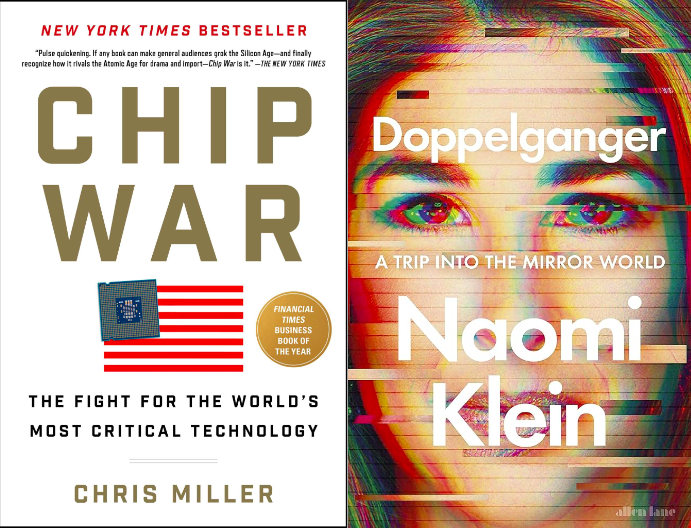Chip War and Doppelganger -- Two Lenses into Threats Facing the US

This week I want to talk about two books. One I am in the process of reading and one that I just finished. A few newsletters back, I raved about Chip War by Chris Miller. But I had to put it down because my local library delivered Naomi Klein's Doppelganger, after a wait of several months.
So, I'm going to give a mid-book check-in on Chip War and discuss lessons about Diagonalism from Klein’s Doppelganger.
First, Chip War: A key premise of the text is that semiconductors and other forms of microchips are integral to the global economy. However, the vast, vast majority of top tier chips are manufactured in a single plant located in Taiwan. The US, Singapore, Seoul, and Japan have semiconductor manufacturing but Taiwan's TSMC plant is the 800lb gorilla of high-performing chips with $73 billion in revenue in 2023.
Meanwhile, America's 1980s chip giant, Texas Instruments and 1990s behemoth Intel, have largely atrophied due to a mix of poor leadership, institutional complacency, and attempts to maximize shareholder value rather than further innovate.
Miller argues, I think convincingly, that semiconductors are as essential to our modern life as oil was over the last 50 years. Thus, the world's two economic superpowers, the US and China, have an incentive to guarantee their access to semiconductors. At one point, Miller notes the numerous US military interventions and projections of military force undertaken in the post-World War II era to guarantee US access to oil. The unstated (as of yet in the text) premise being that if the US willingly went to war multiple times in order to maintain access to oil from the Gulf region, would not today’s other great powers have the same motivation to maintain their access to chips?
In the video below Warren Buffett talks about TSMC’s market dominance and precarious geo-political situation.
The national security implications of this are astounding because of the ways semiconductors are integrated into almost every consumer product: not only phones, laptops, TVs, video game consoles, but also “smart” thermostats, appliances, cars, and US defense technology.
The aspect of the book I am most taken by is the extent to which the US fumbled the bag on semiconductors. These products are largely American inventions, however in pursuit of lower costs, production was moved overseas. Within a generation, the countries that were supposed to be just manufacturing semiconductors learned to design better and cheaper chips than US firms. The US now finds itself trying to kickstart domestic production and guarantee access to the technology it created.
It’s a story we’ve seen before: mid-twentieth century US auto manufacturing was unstoppable, but by the 70s, the US big three automakers were on the ropes. We’re also seeing this happen again with electric vehicles, as China’s BYD recently eclipsed Tesla to become the world’s number one seller of EVs.
I reckon I’m on pace to finish the book early next week but it’s not too late for you to grab a copy and join me.

Naomi Klein’s Doppelganger: The Canadian author and activist dissected capitalism's virtues and violence for over two decades through books like No Logo and The Shock Doctrine.
When I read No Logo, it helped me understand how the globalization of brands drives down wages and drives up consumer costs. If you meet me in person, you’ll note with the exceptions of soccer jerseys (a notable blindspot), I try my best to avoid being a walking billboard for corporate brands. In Tacoma, it was hoodies and flannel. Here in the Gulf, it’s plain tees and plaid button-downs to work.
In The Shock Doctrine, I was introduced to the concept of disaster capitalism—making money from misery—the practice of corporations and governments using crises as an excuse to push through erstwhile untenable policies. Think of the post-9/11 PATRIOT Act, post-Katrina gutting of public schools and teacher unions in New Orleans, and the hoovering of homes by institutional landlords in America’s cities during the zero interest environment of the peak-pandemic period.
On the surface, Doppelganger is an examination of Klein’s relationship, at a distance, with Naomi Wolf. Wolf, a woman for whom Klein is frequently confused, is a 1980s era feminist hero who has migrated to the fringes of the political right and is a frequent guest in the Steve Bannon and Alex Jones circuit. Wolf’s right-ward turn coincides with a rather embarrassing incident where she was humiliated on BBC Radio for shoddy research in her book Outrages (see below). Prior, Wolf also got worked by Sasha Baron Cohen in his Ali G. persona. She has since become a vaccine skeptic and general paranoid (read: 5G and implanted microchip conspiracies). Wolf’s wide world of conspiracy is like a funhouse mirror of Klein's writings and critiques of capitalism.
However, that's really just the hook.
The book is actually about Diagonalism, a phenomenon that I have witnessed, but up until now lacked the proper nomenclature for. Borrowed from the German, Querdenken, Diagnolism is conspiracy driven thinking that produces a right-ward political lurch, creating otherwise irrational bedfellows. This article from the Boston Review captures it better than I am likely doing here:
Born in part from transformations in technology and communication, diagonalists tend to contest conventional monikers of left and right (while generally arcing toward far-right beliefs), to express ambivalence if not cynicism toward parliamentary politics… Diagonal movements trade in both familiar and novel fantasies about elite control. They attack allegedly “totalitarian” authorities, including the state, Big Tech, Big Pharma, big banks, climate science, mainstream media, and political correctness.
The appeal of Diagonalism is obvious. Who doesn't enjoy a good conspiracy now and then? But when conspiracy thinking becomes your only lens, your politics and moral philosophy are no longer grounded. I think we saw this most clearly with the frothing mob responses to Covid measures in many US states.
This term also helps me to contextualize crunchy online granola moms who have lurched right-ward. It helps explain figures like Matt Taibbi who have gone from praising the virtues of the Occupy Wall Street Movement to being an apologist for some of the worst actors in our politics.
This Diagonalist “thinking” flourishes in corners of the internet trafficked by millions; it's not particularly coherent, but often embraces the language of the political left while embodying a form of hyper-individualism. They use phrases like “body autonomy” and “my body, my choice” as anti-vaccine slogans.
A political philosophy that lacks an actual philosophy and is grounded in conspiracy is the last thing our already broken politics needs. But Diagonalists, who see a conspiracy around every corner, have a foothold in one of the two major political coalitions and have their own media ecosystem and social networks. Their ability to get traction for their movement may decide future elections.
Or at least that’s Klein’s thesis.
If you've read Chip War or Doppelganger I would love to hear your thoughts on either text.
See you next week.